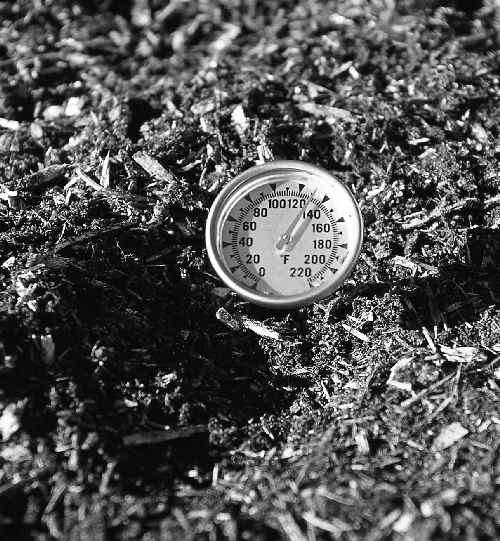| | What is compost? | What should temperatures be? | What is temperature telling me? | How do I measure temperature? | Where can I find these and how much do they cost?
Composting livestock manure can address some of the problems and concerns related to intensive livestock operations while providing many other benefits to producers.
What is Compost?
Composting is the biological decomposition and stabilization of organic material. The Manure Composting Manual, Agdex 400/27-1, produced by Alberta Agriculture, Food and Rural Development describes the process, methods, site selection, regulations and compost uses, so please refer to this document for detailed information (instructions for ordering this manual are at the end of this factsheet).
What Should Temperatures Be?
The compost temperature increases due to the microbial activity, and the change is noticeable within a few hours of forming a windrow. The temperature usually increases rapidly to 50 to 60°C, and this is the level where the temperature is maintained for several weeks. This period is called the active composting stage. The temperature gradually drops to 40°C as the active composting slows down and the curing stage begins.
Composting essentially takes place within two temperature ranges: 10 to 40°C and higher than 40°C. Temperatures above 40°C are desirable because these higher levels destroy more pathogens, weed seeds and fly larvae in the manure. Composting temperatures of 45 to 65°C, when extended for more than a two-week period, are able to kill pathogens and destroy the viability of weed seeds.
| Table 1. Temperature indicates stage in composting process |
| Temperature | Indicates | Action |
| 50 - 60°C | Active stage | Monitor temperature |
| > 60°C | 1. Low to moderate moisture
2. Microorganisms are working hard and generating damaging heat | Add moisture and turn windrow
Turn to accelerate heat loss |
|
| < 50°C | 1. Insufficient oxygen/aeration
2. High moisture content | Turn to increase oxygen
Add dry material |
|
| ~ 40°C with no response from above actions | Material is entering the curing stage | Monitor temperature |
What is Temperature Telling Me?
Temperature is a very good indicator of the process occurring within the composting material (Table 1). Temperatures can exceed 65°C, but many micro-organisms begin to die, which stops the active composting stage.
Heat loss occurs primarily because of water evaporation from the pile. Allowing the moisture content to fall too low will increases the chance of reaching the damaging high temperatures.
During the active composting stage, the temperature should be monitored daily. A sustained drop in temperature indicates the end of the active composting stage. The failure of a cooled compost windrow to reheat after turning indicates that decomposition has slowed enough for the compost to be cured.
How do I Measure Temperature?
It is important to measure the temperature as close to the centre of the composting material as possible. Typically, a thermometer with a 1 m long probe is sufficient to achieve this goal (Figure 1). The temperature can vary within the material, so it is important to measure the temperature in a variety of locations.

Figure 1. Probe to measure compost temperature (Fahrenheit).
Where Can I Find These and How Much Do They Cost?
Buyers should research their needs and the products available before making a purchase. Providing possible supplier names and product descriptions below does not constitute an endorsement of any kind by Alberta Agriculture (Table 2).
| Table 2. Probes for compost temperature monitoring |
| Supplier | Instrument | Probe Length | Readout | Approx. cost |
Wika Instruments
3103 Parsons Road
Edmonton, Alberta
(780) 463-7035 | Bimetal temperature probe | 12 - 36 inches | 3 inch dial | $100 CDN |
|
|
|
|
ReoTemp
10656 Roselle Street
San Diego, CA
1-800-648-7737 | Bimetal temperature probe | 24 - 72 inches | 3 - 5 inch dial | $100 - 250 US |
| Handheld digital thermometer | Purchase separate |  | $150 - 280 US |
| Thermocouple probe | 36 - 60 inches | Needs digital display | $200 - 270 US |
| Solar digital compost thermometer | 24 - 72 inches |  | $180 US |
Omega Engineering Inc.
1 Omega Drive
Stamford, CT
1-800-848-4286 | Stainless steel probe | 12 - 72 inches | 3 inch dial | $100 - 200 US |
|
|
|
|
CE Franklin
5305 - 64 Avenue
Taber, Alberta
(403) 223-1111 | Stainless steel probe | 36 inches | 5 inch dial | $155 CDN |
To order a copy of the Manure Composting Manual, Agdex 400/27-1, contact:
Alberta Agriculture, Food and Rural Development
Publications Office
Telephone: toll-free 1-800-292-5697
For more information, contact:
Virginia Nelson, M.Sc., P.Eng
AgTech Centre, Lethbridge
Telephone: (403) 329-1212
Fax: (403) 328-5562
Source: Agdex 400/27-2. May 2005. |
|